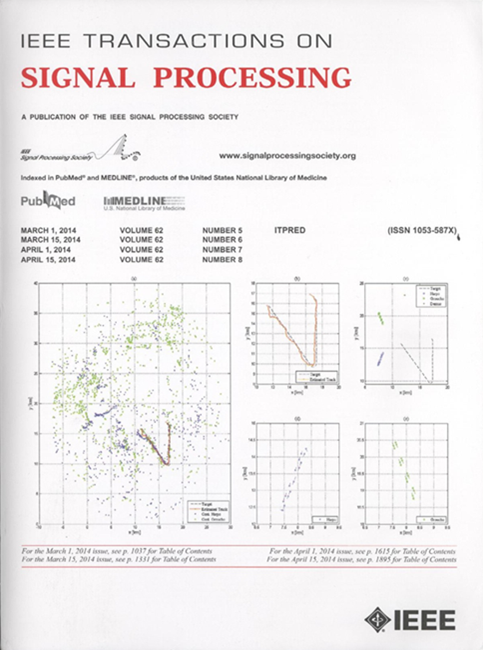分布式鲁棒接收组合
IF 5.8
2区 工程技术
Q1 ENGINEERING, ELECTRICAL & ELECTRONIC
引用次数: 0
摘要
本文从统计机器学习的角度研究无线传输中的信号估计(即接收组合),其中发射信号可能来自集成的传感和通信系统;即:1)信号既可以是离散的星座点,也可以是任意的复值;2)信号可能是空间相关的。特别注意处理各种不确定性,如发射信号协方差的不确定性、信道矩阵的不确定性、信道噪声协方差的不确定性、信道脉冲噪声的存在、功率放大器的非理想性以及导频的有限样本量。在此基础上,提出了一种对上述不确定性不敏感的分布式鲁棒接收组合框架,表明信道估计不是必要的操作。为了实现最优线性估计,该框架将几种现有的组合方法作为对角加载和特征值阈值等特殊情况。对于最优的非线性估计,估计器被限制在重现核Hilbert空间和神经网络函数空间,并推导出相应的不确定性感知解(如核化对角加载)。此外,我们证明了脊和核脊回归方法在机器学习中对特征协方差的对角扰动具有分布鲁棒性。本文章由计算机程序翻译,如有差异,请以英文原文为准。
Distributionally Robust Receive Combining
This article investigates signal estimation in wireless transmission (i.e., receive combining) from the perspective of statistical machine learning, where the transmit signals may be from an integrated sensing and communication system; that is, 1) signals may be not only discrete constellation points but also arbitrary complex values; 2) signals may be spatially correlated. Particular attention is paid to handling various uncertainties such as the uncertainty of the transmit signal covariance, the uncertainty of the channel matrix, the uncertainty of the channel noise covariance, the existence of channel impulse noises, the non-ideality of the power amplifiers, and the limited sample size of pilots. To proceed, a distributionally robust receive combining framework that is insensitive to the above uncertainties is proposed, which reveals that channel estimation is not a necessary operation. For optimal linear estimation, the proposed framework includes several existing combiners as special cases such as diagonal loading and eigenvalue thresholding. For optimal nonlinear estimation, estimators are limited in reproducing kernel Hilbert spaces and neural network function spaces, and corresponding uncertainty-aware solutions (e.g., kernelized diagonal loading) are derived. In addition, we prove that the ridge and kernel ridge regression methods in machine learning are distributionally robust against diagonal perturbation in feature covariance.
求助全文
通过发布文献求助,成功后即可免费获取论文全文。
去求助
来源期刊

IEEE Transactions on Signal Processing
工程技术-工程:电子与电气
CiteScore
11.20
自引率
9.30%
发文量
310
审稿时长
3.0 months
期刊介绍:
The IEEE Transactions on Signal Processing covers novel theory, algorithms, performance analyses and applications of techniques for the processing, understanding, learning, retrieval, mining, and extraction of information from signals. The term “signal” includes, among others, audio, video, speech, image, communication, geophysical, sonar, radar, medical and musical signals. Examples of topics of interest include, but are not limited to, information processing and the theory and application of filtering, coding, transmitting, estimating, detecting, analyzing, recognizing, synthesizing, recording, and reproducing signals.
 求助内容:
求助内容: 应助结果提醒方式:
应助结果提醒方式:


